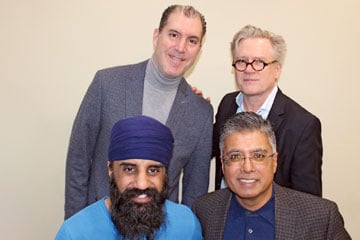
An impasse between Pardeep Singh Nagra and the Canadian Amateur Boxing Association transformed within a few days from a sports dispute into a human rights precedent in the country and also a story that received national media attention.

An impasse between Pardeep Singh Nagra and the Canadian Amateur Boxing Association transformed within a few days from a sports dispute into a human rights precedent in the country and also a story that received national media attention.
Nearly 20 years later, the legal and boxing battle is a feature film, with Mickey Rourke playing the role of the grizzled trainer and actor Prem Singh as Nagra, who fought to box with a full beard, which is an article of his Sikh faith.
The movie, entitled Tiger, opened in theatres on Nov. 30 and, as is the case with any feature film “based on a true story,” there are some changes to the facts and the people involved.
Lawyers Satwinder Gosal, Jim Smith and Chris Leafloor, who obtained a last-minute Ontario Superior Court injunction in December 1999 to permit Nagra to fight in the national championships without shaving his beard, are not portrayed in the film.
Instead, they have been replaced by a single character played by Janel Parrish, who is the lawyer and love interest to Nagra.
The movie is also set in the United States and many scenes were shot in Hamilton, Ohio.
“She does a very good job,” says Smith about Parrish’s performance.
Despite the artistic licence taken by the filmmakers, all three lawyers are pleased that a movie has been made about Nagra and his struggle to have his religion respected so he could compete in his chosen sport.
“The injustice I think is something that everyone can understand,” says Gosal. He and Smith are partners at the RZCD Law Firm LLP in Mississauga.
Leafloor, who was a colleague at the firm at the time they all acted for Nagra, has been a Crown attorney in Toronto with the Public Prosecution Service of Canada and the Department of Justice for a number of years.
The real-life back story to the legal dispute began in 1998 when Nagra filed a human rights complaint against the Ontario Boxing Association, because of its requirement that all boxers be clean shaven.
That complaint was resolved by mediation and he was permitted to compete.
Nagra won his weight division, but a few days before the Canadian championships in Campbell River B.C., he was informed by the national federation that he could not compete unless he shaved his beard. The national championships were part of the selection process for the Sydney Olympics, so the stakes were high for Nagra. He contacted Gosal, who then consulted with Smith and Leafloor on what action to take.
The lawyers concluded that asking for an injunction was the only way to obtain a remedy so Nagra could compete.
“It was 43 hours from the time we learned about the problem until we obtained the injunction,” Leafloor recalls.
The boxing association was served, but it declined to send a lawyer to respond when the matter was argued in a courtroom at Osgoode Hall. Justice William Somers agreed to issue an injunction that required the association to allow Nagra to compete.
When it learned about the injunction, the boxing association decided to cancel the entire competition in Nagra’s weight class rather than comply with the court order. That decision turned the case into a national news story about Nagra and his fight to observe his faith.
“He is articulate and an athlete. He was the perfect client” to highlight the broader human rights issue, says Smith.
A month later, the Superior Court issued a permanent injunction ordering Nagra to be permitted to compete and found that the requirement for him to be clean shaven was a breach of the Charter.
The association re-scheduled a “box-off” in Nagra’s weight class, but he was defeated by the defending national champion and was not selected to compete in the Olympics.
Nagra, who is currently the manager of employment equity at the Toronto District School Board, has continued to try to change international rules that prohibit boxers from wearing beards. While his case ended the prohibition in Canada, it was not until earlier this year that amateur boxing officials in England agreed to end their ban.
While Nagra’s story may have been turned into a Hollywood movie, the human rights issues are just as relevant two decades later, says Gosal, given the current political climate and calls by some groups and politicians to restrict the wearing of religious head coverings.
“I think we are much better in Canada than a lot of countries. But have we progressed in terms of human rights? It is an ongoing process,” says Gosal.